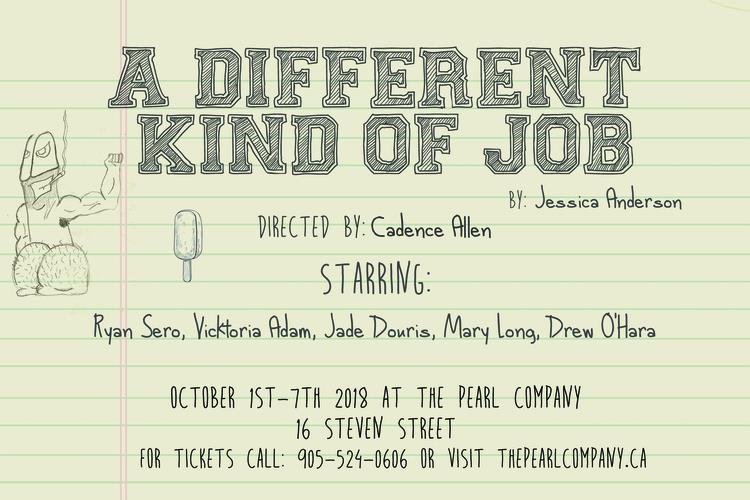Building a consent culture is vital in creating a safer society, particularly for women. This play has the opportunity to open up some dialogue about this topic.
By Liz Buchanan
Published October 02, 2018
This week, Jessica Anderson's play, A Different Kind of Job, opens at the Pearl Company. The play examines the politics of a conservative and highly religious small town high school's policies around sex education. When two students engage in a sex act (that neither properly understands), a series of choices and events lead a young teacher down a path that could cost him his job and reputation.

A Different Kind of Job
At the core of the play is the a question of the role of educators in teaching students about consent: a timely question, given the current controversy surrounding Ontario's Health and Physical Education curriculum, and the need for dialogue around how to address the lack of understanding around consent in our society, following the revelations of the #MeToo movement.
This is also a topic near and dear to my heart. I work as a Public Educator for a women's shelter, presenting to elementary and high school students on a variety of topics related to healthy relationships. Consequently, I often discuss consent with teenagers as it at the core of any healthy relationship, and an important component of ending gender-based violence.
Building a consent culture is vital in creating a safer society, particularly for women. As I'm also a theatre artist, I'm thrilled that this play has the opportunity to open up some dialogue about this topic.
So, what is consent? Consent, according to Canada's Criminal Code in S. 273.1(1), is the voluntary agreement to engage in the sexual activity in question. Sexual Assault is sexual activity without consent.
Often when people think of Sexual Assault, they are thinking specifically of rape, which is sexual intercourse without consent. However, kissing, groping and oral sex all fall under this umbrella term. As a society, we have determined that legally, no one should sexually touch anyone else without their consent, and yet we know from the #MeToo movement that this happens a disturbing amount.
While I think there is a great deal of inherent value in simply recognizing that we, as a culture, have a problem, many people have been looking at #MeToo and asking "OK, so what now?"
To me, this is where education can take the lead. Educators have the opportunity to present factual information about consent, its importance and to give young people the language to communicate about their relationships.
Anderson's play looks at what can go wrong when there's a lack of communication and transparency in sexual health education. There is often debate over how much information should be given to students, and to what extent the school should be involved in this education (as opposed to parents and/or guardians).
One thing we can all agree on (I hope, at least) is that we want to live in a world where everyone who has sex has consented to that sex. We want a world without sexual assault. While I'm not such an idealist to believe that we can eliminate all acts of violence from the world, at the very least we must be able to do better than we have been. So what can we do?
According to Western University's Centre for Research and Education on the Prevention of Violence Against Women and Children, when developing effective education programs to end gender-based violence:
Sexual violence prevention efforts have transitioned from awareness campaigns to advancing social norms that promote healthy, egalitarian gender roles, gender equality, healthy relationships and healthy sexuality.
Preventing sexual violence is about shifting attitudes and social norms. We have normalized sexual violence to the point that a man who was recording bragging about sexually assaulting women was elected to the Presidency of the United States. Consent education means raising the bar on what's considered socially acceptable behaviour.
To that last point about "healthy sexuality": there seems to be a disconnect for many people between teaching consent and comprehensive sexual education. Consent is absolutely compatible with abstinence. In fact if someone is choosing abstinence, consent education should involve respecting that choice. The moment someone is being pressured into sexual activity that they don't agree to, consent is gone.
Consent is meant to be given freely and enthusiastically. My frustration with "abstinence-only" education is that it reinforces the false idea that people cannot control what they do with their bodies.
Another aspect of Anderson's play, which I found encouraging, is a dialogue around who we teach "responsible behaviour" to: the traditional warning to young women "be wary of young men" is missing a big part of the picture. The onus has traditionally been placed on women to avoid getting sexually assaulted, rather than telling men not to sexually assault.
While I honestly believe the majority of men do know better and essentially mean well, putting the responsibility of prevention on women creates precisely the sort of culture where women don't want to come forward. I've personally experienced my share of "Why did you let him do that to you?" and "Well what did you expect?"
Consent education is about shifting the responsibility onto the person initiating the sexual activity, and creating a culture which not only accepts "no" for an answer, but also seeks enthusiastic consent.
At its best, theatre provokes discussion and I hope that A Different Kind of Job can engage us all in more discussion around this important issue.
You must be logged in to comment.
There are no upcoming events right now.
Why not post one?